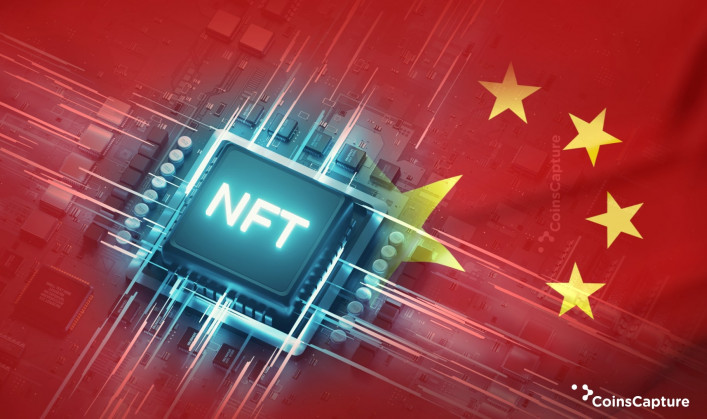7 November 2025
Top 5 NFT Marketplaces in China for 2022
The global market for trading digital artwork, a prominent kind of NFT, has reached a fever pitch since digital artist Beeple sold his piece Everydays: the First 5000 Days which is a computer picture for $69 million in March of last year. Tokens that can only be exchanged for their original value are called "non-fungible tokens," or NFTs, and they are stored on a blockchain. Several people are familiar with Non-Fungible Tokens as a way to prove ownership of digital works of art, images, music, videos, and in-game objects, but NFTs may be used to prove ownership of almost any of it.
Also Read: 10 Best NFT Marketplace Development Companies In France
Currently, there are approximately 200 active trading marketplaces in China's thriving NFT business. Statista reports that the majority of "NFT"-related Google searches originate in China. China's NFT sales are expected to hit US $4.57 billion by 2026. We predict that by the middle of the next decade, China's Metaverse market will be worth about US$50 billion. NFT, or Virtual Antiques, is a developing phenomena in China for 2022 despite the prohibition on Cryptocurrencies and a still-unclear legal framework.
Also Read: 5 Most Popular NFT Startups In Spain
As of 2022, here are the top 5 NFT marketplaces in China that play a major role and also differentiate themselves:
1. BSN: BSN-DDC
On January 24th, BSN-DDC, short for Blockchain Services Network Distributed Digital Certificate, China's centrally supported blockchain infrastructure, debuted its very own NFT platform. For organizations interested in developing NFT platforms in accordance with Chinese rules, BSN-DDC offers the necessary blockchain infrastructure. Ten different public blockchains have been incorporated into the system at this time, namely Algorand, Cosmos, Ethereum, Polkadot, Tezos, as well as Nervos. Such hybrid implementations of public blockchain are functionally distinct from their bare-bones forebears in that they place constraints on who may control the blockchain, require members to verify their identities, and replace Cryptocurrencies with fiat money.
2. JingTan (Topnod)
JingTan, built by Ant Group, is one of China's most well-known online marketplaces. Alibaba, a colossal corporation in China, owned the Ant Group. There are more than 26 million people using the platform, and more than 6 million visitors per day. There are thousands of digital valuable objects to choose from, including museum-quality works of art, music, and historical relics. The site is powered by a blockchain hybrid dubbed AntChain, which is not fully decentralized and collaborates with many government agencies. Users who have acquired NFTs from JingTan (Topnod) are required to wait for a minimum 180 days before being able to give them to some other entity. This policy is in place to reduce the likelihood of any potential legal repercussions.
3. Tencent: Huanhe
Huanhe, a digital collectibles platform developed by Tencent and based on Zxin Chain, a government-authorized corporate blockchain network, offers a wider variety of items than Topnod. Huanhe collaborates with institutions like museums and galleries, celebrities like musicians and actors, and companies like car manufacturers and manufacturers of consumer goods to distribute digital works benefiting charitable causes. As part of their mission to promote and hasten the digitalization of China's cultural and museum sectors, Chinese websites often use digital treasures to highlight the country's rich history and tradition. For RMB 118 ($18), Huanhe sells digital reproductions of murals from the world-famous Dunhuang Mogao Grottoes, as well as digital paintings by renowned Chinese artists such as Qi Baishi.
4. Lingxi
JD.com, among the largest eCommerce merchants in China, followed in the footsteps of Alibaba and Tencent by issuing its own version of Non Fungible Tokens (NFTs) on its Lingxi platform. The NFTs were made available at no cost to everyone who registered for JD.com's annual tech conference via JD Technology. The seven NFTs, >
5. NFTCN
Compared to the other two digital collectable platforms in the China market, NFTCN caters to individual artists and collectors interested in making and buying NFTs. The art market accepts NFTs for purchases, as well as an integrated gallery where users may show off their own collections of digital and real works. The website only cryptically states that the marketplace's back-end technology is built on a chain length of Ethereum. When making purchases on the network, customers may avoid interacting with Cryptocurrency by instead obtaining special cards from the website using fiat cash. NFTCN is unique among Chinese NFT markets in that it has a second hand market whereby enthusiasts may sell or trade their items.
The Bottomline
China is working cautiously to create the legal foundation for the sector, despite the fact that the NFT industry has tremendous opportunities. The Blockchain Services Network (BSN) in China has released the framework for establishing domestic NFT platforms that employ virtual yuan rather than Cryptocurrency. China has plans to create a NFT environment that is uniquely Chinese. Additional potential applications for NFTs have yet to be discovered. By using Metaverse Marketing, even international businesses may break into the NFT industry.
Disclaimer: The author’s thoughts and comments are solely for educational reasons and informative purposes only. They do not represent financial, investment, or other advice.






